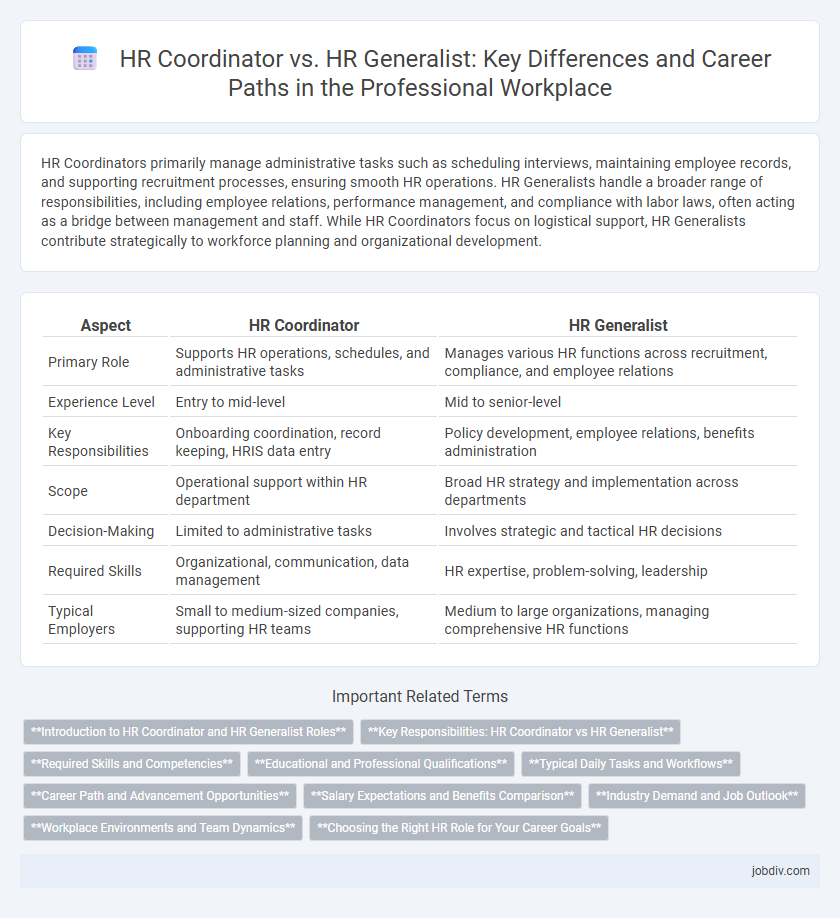HR Coordinators primarily manage administrative tasks such as scheduling interviews, maintaining employee records, and supporting recruitment processes, ensuring smooth HR operations. HR Generalists handle a broader range of responsibilities, including employee relations, performance management, and compliance with labor laws, often acting as a bridge between management and staff. While HR Coordinators focus on logistical support, HR Generalists contribute strategically to workforce planning and organizational development.
Table of Comparison
| Aspect | HR Coordinator | HR Generalist |
|---|---|---|
| Primary Role | Supports HR operations, schedules, and administrative tasks | Manages various HR functions across recruitment, compliance, and employee relations |
| Experience Level | Entry to mid-level | Mid to senior-level |
| Key Responsibilities | Onboarding coordination, record keeping, HRIS data entry | Policy development, employee relations, benefits administration |
| Scope | Operational support within HR department | Broad HR strategy and implementation across departments |
| Decision-Making | Limited to administrative tasks | Involves strategic and tactical HR decisions |
| Required Skills | Organizational, communication, data management | HR expertise, problem-solving, leadership |
| Typical Employers | Small to medium-sized companies, supporting HR teams | Medium to large organizations, managing comprehensive HR functions |
Introduction to HR Coordinator and HR Generalist Roles
HR Coordinators manage administrative tasks such as scheduling interviews, maintaining employee records, and coordinating onboarding processes to support HR functions efficiently. HR Generalists handle a broader scope, including employee relations, performance management, policy implementation, and compliance with labor laws, requiring deeper knowledge of HR practices. Both roles are essential to organizational success, with the Coordinator focusing on operational HR support and the Generalist providing strategic HR management.
Key Responsibilities: HR Coordinator vs HR Generalist
HR Coordinators primarily manage administrative tasks such as scheduling interviews, maintaining employee records, and coordinating onboarding processes, ensuring smooth HR operations. HR Generalists handle a broader scope that includes employee relations, performance management, policy implementation, and compliance with labor laws. The HR Generalist's role requires strategic involvement in workforce planning and conflict resolution, while the HR Coordinator focuses on logistical and support functions within the HR department.
Required Skills and Competencies
HR Coordinators require strong organizational skills, proficiency in HRIS systems, and attention to detail for managing administrative tasks such as scheduling and record-keeping. HR Generalists need advanced interpersonal skills, comprehensive knowledge of labor laws, talent management expertise, and the ability to handle employee relations and strategic HR functions. Both roles demand confidentiality, communication skills, and adaptability to support diverse HR processes effectively.
Educational and Professional Qualifications
HR Coordinators typically possess a bachelor's degree in Human Resources, Business Administration, or related fields, often paired with entry-level certifications like SHRM-CP or PHR. HR Generalists require more advanced qualifications, such as a bachelor's degree complemented by extensive HR experience and professional certifications like SHRM-SCP or SPHR. Practical knowledge of labor laws, employee relations, and strategic HR management distinguishes HR Generalists from HR Coordinators in professional settings.
Typical Daily Tasks and Workflows
HR Coordinators primarily manage administrative tasks such as scheduling interviews, maintaining employee records, and coordinating onboarding processes, ensuring smooth day-to-day HR operations. HR Generalists handle broader responsibilities including employee relations, policy implementation, benefits administration, and performance management, integrating strategic HR functions with daily workflows. Both roles require strong organizational skills, but HR Generalists focus more on employee lifecycle management while HR Coordinators support transactional activities.
Career Path and Advancement Opportunities
HR Coordinators typically begin their careers managing administrative tasks and supporting HR operations, which provides a foundational understanding of human resources functions. HR Generalists, on the other hand, handle a broader range of responsibilities including employee relations, compliance, and talent management, positioning them for mid to senior-level HR roles. Career advancement from HR Coordinator to HR Generalist roles often leads to specialized HR positions such as HR Manager, HR Business Partner, or Talent Acquisition Specialist, with increased leadership and strategic responsibilities.
Salary Expectations and Benefits Comparison
HR Coordinators typically earn between $45,000 and $60,000 annually, reflecting their focus on administrative HR tasks, while HR Generalists command higher salaries ranging from $60,000 to $80,000, due to broader responsibilities including employee relations and compliance. Benefits packages for HR Generalists often include enhanced options like leadership development programs and performance bonuses, contrasting with the standard healthcare and retirement plans offered to HR Coordinators. Salary growth potential favors HR Generalists because of their strategic role, making them more competitive in industries seeking versatile HR skills.
Industry Demand and Job Outlook
Industry demand for HR Coordinators remains steady due to their vital role in administrative support and recruitment processes, commonly observed in mid-sized companies and growing startups. HR Generalists experience higher job outlook growth, driven by their broader expertise in employee relations, compliance, and strategic HR functions across large corporations and dynamic industries. Projections from the U.S. Bureau of Labor Statistics indicate a 7% growth rate for HR Generalists through 2031, outpacing the more specialized HR Coordinator roles.
Workplace Environments and Team Dynamics
HR Coordinators typically operate in structured workplace environments, supporting specific HR functions such as recruitment or onboarding within defined teams. HR Generalists engage across multiple HR domains, fostering cross-functional collaboration and adapting to diverse team dynamics in more fluid organizational settings. Understanding these distinctions enhances strategic HR planning and promotes a cohesive workplace culture.
Choosing the Right HR Role for Your Career Goals
Evaluating your career goals, an HR Coordinator primarily handles administrative tasks such as scheduling interviews and maintaining employee records, making it ideal for entry-level professionals seeking foundational HR experience. In contrast, an HR Generalist manages a broader scope including employee relations, performance management, and compliance, suited for those aiming to develop comprehensive HR expertise. Selecting the right role depends on your desired skill development, with coordinators offering operational support experience and generalists providing strategic HR involvement.
HR Coordinator vs HR Generalist Infographic

 jobdiv.com
jobdiv.com